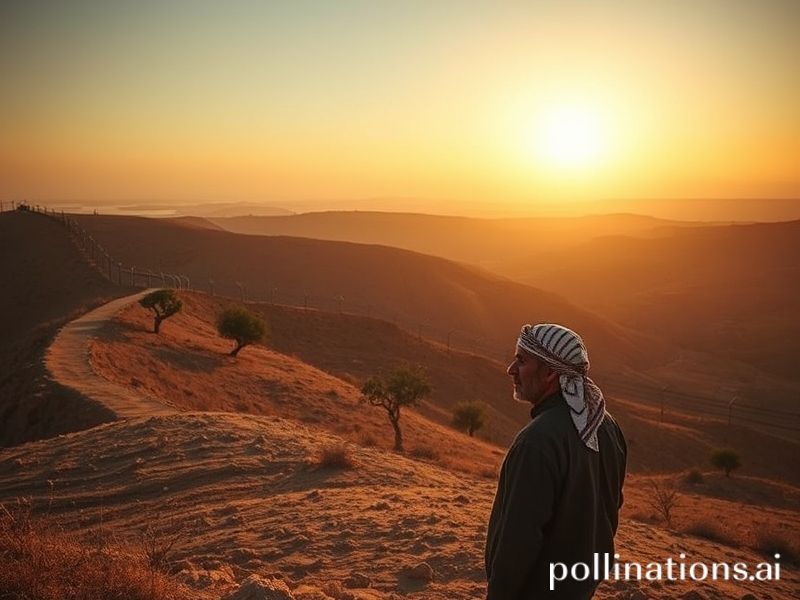West Bank: The World’s Most Efficient Hypocrisy Mirror
RAMALLAH—Drive an hour east from Tel Aviv and the Mediterranean’s carefree hummus-and-hookup vibe dissolves into something older, heavier, and stubbornly unresolved. Welcome to the West Bank, a 2,200-square-mile slice of hill country that the 21st century keeps trying—and failing—to file under “finished business.” Half museum of colonial cartography, half real-time experiment in asymmetric sociology, the territory is simultaneously occupied, disputed, longed for, and loathed. If the Holy Land is humanity’s greatest-hits album, the West Bank is the hidden track that still records fresh screams every night.
The numbers read like a grim joke told by an accountant: roughly three million Palestinians, upward of 450,000 Israeli settlers, 165 enclaves nicknamed “Area A” where the Palestinian Authority pretends it’s sovereign, 63 percent of land still fully controlled by the Israeli military, and one separation barrier—part security, part Rorschach test—snaking 440 miles between backyards, olive groves, and the occasional kindergarten. All this in a space smaller than Delaware, a state whose chief export is credit-card junk mail and whose main border worry is stray chickens.
International diplomats, when they still bother, recite the two-state mantra the way medieval peasants mumbled Latin they didn’t understand. Meanwhile the physical reality metastasizes: new Israeli outposts, euphemistically called “new neighborhoods,” appear on hilltops like upscale mushrooms; Palestinian suburbs languish under building-permit regimes so Kafkaesque they could be performance art. The European Union funds solar panels for off-grid Bedouin encampments; Israeli bulldozers periodically confiscate them, citing lack of permits. Everyone involved uploads the footage, hashtags it, and waits for outrage that expires faster than milk.
Why should anyone beyond the Jordan Valley care? Because the West Bank is the world’s most efficient hypocrisy mirror. Washington green-lights $3.8 billion in annual military aid to Israel while scolding Moscow for land-grabs; Gulf monarchies bankroll Palestinian hospitals then normalize with Israel faster than you can say “Abraham Accords”; China sells surveillance drones to both sides while hosting conferences on “conflict-resolution tech.” Every global player gets to test-market talking points here before deploying them at home. Think of it as geopolitical A/B testing with live ammunition.
The economic subplot is equally instructive. The West Bank’s GDP per capita hovers around $4,000, less than what a junior lobbyist in Brussels spends on artisanal coffee in a year. Yet the territory is awash in donor money—$30 billion since Oslo—making it simultaneously one of the most subsidized and least self-sufficient places on Earth. Local entrepreneurs pivot between selling knock-off olive oil to idealistic tourists and designing apps that locate the day’s nearest protest/closure/air-strike. Call it Series-A under siege: minimum viable sovereignty, maximum viable grievance.
Climate change, the planet’s other unifying catastrophe, is also auditioning here. Rainfall is down 20 percent since the 1990s; Israeli settlers enjoy subsidized swimming pools while Palestinian villages truck in water by tanker, creating a hydrological caste system. If you want a preview of how water stress weaponizes identity, book a weekend in the Jordan Valley. Bring sunscreen and a dark sense of humor.
And yet the human firmware somehow updates. Ramallah’s nightlife scene—yes, nightlife—features rooftop bars where expats sip Negronis while discussing Kafka, bitcoin, and which checkpoint has the shortest queue. In the same hour, a teenager ten miles away might be fashioning a homemade incendiary balloon, because Netflix hasn’t yet optioned his life story. Both are posting to Instagram; both will probably be ghosted by the algorithm.
What does the West Bank tell us, other than that cartography and morality are equally fictitious? Perhaps that every empire eventually subcontracts its cognitive dissonance to a tiny patch of real estate, then acts shocked when the contradictions refuse to stay put. The territory is not doomed; it is overdetermined—a place where every stone has three histories, two police forces, and one pending court case at The Hague. Until the world decides which story it wants to live with, the hills will keep recording fresh takes on the oldest hit single: sovereignty, security, and the right to forget the other guy exists. Curtain hasn’t fallen yet; probably never will. In the meantime, bring cash, multiple SIM cards, and an appetite for irony. The hummus is still excellent.







